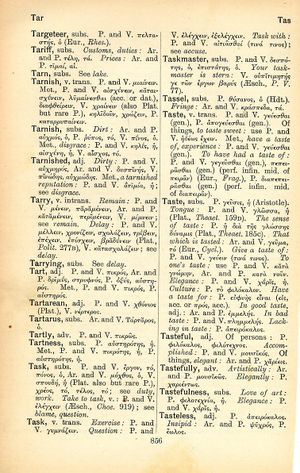taste: Difference between revisions
δειναὶ δ' ἅμ' ἕπονται κῆρες ἀναπλάκητοι → and after him come dread spirits of death that never miss their mark
(CSV5) |
m (Text replacement - "<b class="b2">Frag.</b>" to "''Frag.''") |
||
| Line 8: | Line 8: | ||
Met., <b class="b2">have a taste of, experience</b>: P. and V. γεύεσθαι (gen.). | Met., <b class="b2">have a taste of, experience</b>: P. and V. γεύεσθαι (gen.). | ||
<b class="b2">To have had a taste of</b>: P. and V. γεγεῦσθαι (gen.), πεπειρᾶσθαι (gen.) (perf. infin. mid. of πειρᾶν) (Eur., | <b class="b2">To have had a taste of</b>: P. and V. γεγεῦσθαι (gen.), πεπειρᾶσθαι (gen.) (perf. infin. mid. of πειρᾶν) (Eur., ''Frag.''), P. διαπεπειρᾶσθαι (gen.) (perf. infin. mid. of διαπειρᾶν). | ||
'''subs.''' | '''subs.''' | ||
Revision as of 11:02, 7 August 2017
English > Greek (Woodhouse)
v. trans.
P. and V. γεύεσθαι (gen.), P. ἀπογεύεσθαι (gen.).
Of things, to taste sweet: use P. and V. ἡδέως ἔχειν.
Met., have a taste of, experience: P. and V. γεύεσθαι (gen.).
To have had a taste of: P. and V. γεγεῦσθαι (gen.), πεπειρᾶσθαι (gen.) (perf. infin. mid. of πειρᾶν) (Eur., Frag.), P. διαπεπειρᾶσθαι (gen.) (perf. infin. mid. of διαπειρᾶν).
subs.
P. γεῦσις, ἡ (Aristotle).
Tongue: P. and V. γλῶσσα, ἡ (Plat., Theaet. 159D).
The sense of taste: P. ἡ διὰ τῆς γλώσσης δύναμις (Plat., Theaet. 185C).
That which is tasted: Ar. and V. γεῦμα, τό (Eur., Cycl.).
Give taste of: P. and V. γεύειν (τινά τινος).
To one's taste: use P. and V. κατὰ γνώμην, Ar. and P. κατὰ νοῦν.
Elegance: P. and V. χάρις, ἡ.
Culture: P. τὸ φιλόκαλον.
Have a taste for: P. εὐφυής εἶναι (εἰς, acc. or πρός, acc.).
In good taste, adj.: Ar. and P. ἐμμελής.
In bad taste: P. and V. πλημμελής.
Lacking in taste: P. ἀπειρόκαλος.

